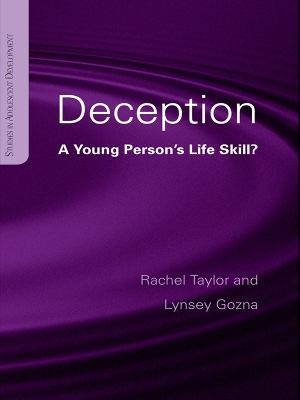This book considers the role of deception during adolescence, and explores the factors which underpin adolescents’ choice to deceive, whether these deceptions will be successful, and the ways in which such lies could be detected. While deception is considered to be antisocial or even pathological in some circumstances, the central argument of this book is that lying can be a skilled behaviour which is necessary to allow adolescents to establish autonomy.
Deception builds on the recent influential developmental challenge model (Hendry and Kloep, 2002, 2009), exploring how it can provide a useful explanatory framework for the development of the skill of deception in adolescence. Interpersonal and forensic settings for deceptive behaviour are referred to, and illustrated with reference to both published research and new data obtained from a variety of different interviews and focus groups with young people. It also considers how the choice to communicate truthfully is as important as the choice to communicate deceptively in illuminating the developmental process. It concludes with a discussion of how adolescents’ deceptions could be detected and presents a range of strategies to maximize the effectiveness of interpersonal interactions with suspected deceivers.
By considering everyday, forensic and clinical deception situations, this book is ideal for academic researchers, practitioners working with children and young people, as well as parents. The observations, interviews and focus groups provide a unique insight into the factors influencing young people’s communication choices, and integrate research from developmental, social and forensic psychology.
- ISBN13 9781136845185
- Publish Date 1 December 2010 (first published 26 November 2010)
- Publish Status Active
- Publish Country GB
- Publisher Taylor & Francis Ltd
- Imprint Psychology Press Ltd
- Format eBook (EPUB)
- Pages 192
- Language English
